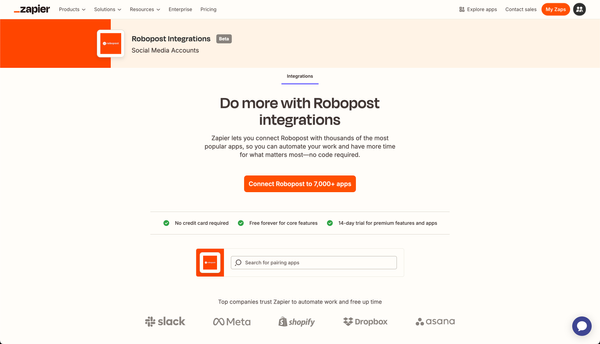The Importance of Social Media Tools in Today's Marketing Landscape
Explore the pivotal role of social media tools in reshaping marketing, enhancing engagement, and driving brand growth in the digital era.

Social media is a key tool for marketers, providing unmatched chances to reach a global audience, understand what customers want, and build brand loyalty. As digital trends change, using social media tools effectively has become more important than ever. This article looks at how social media is changing marketing strategies and improving customer engagement, and why it's crucial to master these tools to succeed in today’s market.
Key Takeaways
- Social media tools have changed marketing by allowing brands to reach a global audience, engage with people online, and build online communities.
- Good social media marketing boosts brand visibility and awareness through well-managed profiles, effective hashtags, and interesting content.
- Getting direct feedback and interacting in real-time on social media helps build stronger customer relationships and encourages brand loyalty.
- Using insights from social media to guide marketing strategies helps create more targeted campaigns and involves customers in the process.
- Marketers need to adapt to new technology and keep genuine interactions to manage the complexities of social media effectively.
The Evolution of Marketing in the Social Media Era
From Traditional to Digital: The Transition of Marketing Strategies
Marketing has changed dramatically from old-school methods like print ads, billboards, and TV commercials to the more interactive world of digital marketing. While the goal of marketing—to connect with people and persuade them to act—hasn't changed, the tools and strategies have adapted to meet the needs of tech-savvy consumers.
- Traditional marketing was a one-way communication process, where messages were sent out to a large audience.
- Digital marketing, on the other hand, enables a two-way conversation between brands and customers through social media.
- The shift also means moving from broad, general targeting to more specific, behavior-based strategies.
Looking ahead, it's important to blend traditional methods with digital tools. For example, using billboards for visibility combined with digital techniques like geotargeting can create a strong marketing impact. The goal is not to ditch traditional methods but to enhance them with digital features to better engage with customers.
Breaking Geographical Barriers: Global Reach of Social Media
Social media has changed the game for businesses, removing international barriers and creating new opportunities. Platforms like Facebook, Instagram, and TikTok let companies reach billions of users worldwide. This kind of access gives businesses, especially smaller ones, a level of visibility that was previously out of reach.
Social media also boosts brand awareness and visibility. Great content can spread a company’s message far and wide, even in a crowded market. There are many chances for viral marketing, working with influencers, and using content created by users, all of which enhance a company’s presence on the global stage.
Maximizing Brand Visibility Through Social Media
Building Brand Awareness with Social Media Platforms
Social media gives businesses a chance to express their brand’s voice and values creatively, reaching a wide and varied audience. By using social media effectively, companies can create a message that connects with their target audience, helping them to be recognized and remembered.
Being able to analyze and respond to what your audience likes is key. Social media gives you instant feedback on consumer behavior, letting brands adjust their approach and boost their visibility. Staying flexible and embracing new trends can help a brand stand out in a crowded online space.
Leveraging Hashtags and Optimized Profiles for Greater Exposure
Hashtags help people find your content among all the other information online. By choosing a mix of popular and niche-specific hashtags, you can reach different groups and make it more likely that more people will see your posts.
It’s also important to optimize your social media profiles. A well-written bio, clear profile pictures, and consistent messaging across platforms make your brand easy to recognize. This consistency helps strengthen your brand identity and makes it simpler for potential customers to find and remember you.
The aim is to make it easy for users to discover and connect with your brand. Regularly updating your hashtags and profile elements can help you stay ahead in the fast-changing world of social media marketing.
Enhancing Customer Relationships with Social Media Engagement
Understanding Customer Needs Through Direct Feedback
Social media has changed how businesses connect with their customers, offering a direct and personal way to communicate. Companies can use comments, messages, and polls to interact with their audience, address concerns, and gather feedback to improve their products or services.
By analyzing feedback from social media, businesses can track important metrics and understand customer behavior. This information helps refine marketing strategies and boost customer satisfaction. Here’s how to gather feedback on social media:
- Share a link to an online survey in your posts.
- Run contests to encourage people to participate.
- Respond quickly to comments and direct messages.
- Use polls and question stickers to get opinions on specific topics.
It’s important to handle negative feedback carefully. Addressing it thoughtfully shows you value customer service and helps build trust with your audience.
Providing Real-Time Interaction and Customer Support
Providing quick response time helps build trust and reliability. For example, automated replies can answer common questions, while more complicated issues can be handled personally.
By including links and call-to-action buttons in interesting content, businesses can encourage customers to learn more and make purchases. Also, adding shopping features directly to social media makes it easier for customers to buy products.
Integrating Social Media with Overall Marketing Strategies
The Role of Social Media in Multi-Channel Marketing Campaigns
Social media is now acting as a central hub that connects different marketing efforts. It helps create a consistent brand experience by linking with other digital channels like email and ads, ensuring a unified message across all platforms, which builds brand trust and recognition.
Social media boosts a brand's reach by working with other marketing methods. This strengthens the brand's identity and drives traffic to both online and physical stores. Using social media’s targeting tools and insights allows businesses to craft messages that connect with their audience, improving their overall marketing impact.
Analyzing Social Media Insights for Targeted Marketing
Analytics act like a guide to making smart decisions in social media marketing. By tracking key performance indicators (KPIs), businesses can understand which content attracts their audience and boosts engagement.
Metrics like reach, engagement, and conversions reveal important details about how people react to your campaigns. These insights help marketers refine their messages to be more effective and ensure their efforts have a real impact.
Here’s a quick look at important social media metrics:
- Reach: The size of the potential audience.
- Engagement: Interactions such as likes, comments, and shares.
- Impressions: How many times content is shown.
- Conversions: Actions users take, like signing up or making a purchase.
Using these metrics, companies can target and segment their audience more precisely, making sure they connect with the right people at the right time.
Navigating the Complexities of Social Media Marketing
Adapting to Technological Advancements and Algorithm Changes
Technology and algorithms on each social media platform are always changing. Marketers need to stay flexible and adjust their strategies to keep up with the latest updates. This means constantly learning and using data to make decisions.
- Keep up with social media trends and changes
- Try out new technologies and platforms
- Use data to improve your strategies
Experimenting with new technologies and channels helps businesses find fresh ways to connect with their audience and boost results. Social media is always changing, so brands need to adapt quickly and anticipate future trends to stay ahead.
Balancing Promotional Content with Authentic Engagement
It’s important to balance promotions with real interactions. Brands should provide useful content without bombarding their audience with ads. Real engagement helps build a strong community and loyalty among followers.
- Respond to comments and messages to connect with followers.
- Show your brand’s human side to gain trust and loyalty.
- Work with micro-influencers who have engaged and specific audiences.
Setting clear goals for social media campaigns helps measure success and improve strategies. Service-based businesses should focus on sharing valuable content that builds trust and demonstrates expertise, rather than just promoting their services.
Staying Ahead in the Dynamic Landscape of Social Media
Marketers need to stay flexible and up-to-date to keep their strategies effective. Success depends on being able to spot and adapt to new trends, updates, and changes in algorithms.
To stay on top, you should:
- Regularly check industry news and updates
- Follow social media experts
- Join webinars and conferences
Trying out different content types, posting times, and engagement strategies is important too. For example, testing different days and times for posts can help you find out when your audience is most active, leading to better engagement and growth. Using tools like Robopost will help you schedule your posts to experiment with the best times to post.
Conclusion
Social media tools are crucial in today's marketing world. They go beyond just being communication channels and have become essential for businesses to connect with their audience, understand what customers want, and build brand loyalty. The feedback and insights from social media help businesses adjust their marketing strategies to fit the changing digital landscape. Companies that use social media effectively can reach more people, have better interactions, and see significant growth. Social media will keep influencing marketing, and those who adapt to its changes will be more successful.
